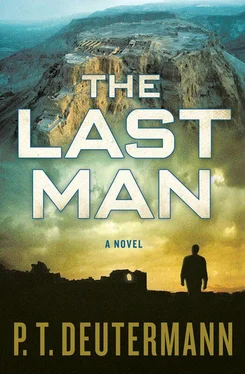Then the slab did move, and he saw her hands scrabbling along the edge, trying to dislodge it. He put his back into it then, and between them they got the thing onto its edge and he was through and standing up in chest-deep water. The marble dropped back into the hole with a flat slap.
David looked at Judith, whose white face told the story. “I couldn’t hold it,” she sobbed. “The water came in everywhere.”
He glanced around the cave, which was now almost one-third full of water. It had risen past the bottom lines of writing on one wall. “Look,” he said, pointing his headlamp. “It’s going back down. I got the pipe into the big slab. The fill system should be pumping water into that cave and outside.”
She collapsed onto her knees in the water and put her face in her hands. He noticed how stuffy the air was in the cave and pushed the spare tank over.
“Here,” he said, switching over the regulator connection and pushing his mouthpiece into her face. “Breathe.”
She grabbed at the mouthpiece and took several deep breaths before he cautioned her to slow down. Then he took a couple of breaths himself. He watched her face. She was calming down, but the whites of her eyes were still showing.
“We’ll let the water go out onto the mountainside for as long as we can stand it in here,” he said. “Then I’ll go unplug the outlet pipe, and hopefully we’ll get an airspace up there by the slab. After that, it’s a matter of time before someone sees all that water.”
“Hopefully,” she murmured. “Always with the hopefully.”
She was trying to crack wise, but her voice gave her away. He needed to distract her. “Yeah, well, look,” he said. “We’re still alive, and this cave is still intact. We have some air now. Someone’s going to see all that water.”
“So now we what, just wait?”
“Yes. We just wait.” He shone his light over the writing on the wall. “You can actually read all this?”
She straightened and looked up at the script, her headlamp throwing a bobbing yellow circle on the wall. “I’ve read almost half of it,” she said. “It’s still terrible.”
“Where does it begin?” he asked, taking another hit on the spare tank.
“There,” she said, getting up and wading over toward the altar structure. The water was definitely receding, he thought. The parts of the writing that had been wetted were beginning to run down the wall.
“Here. It begins like this: I am Judah Sicarius, son of Joseph. I shall be the Last Man. ”
* * *
Ellerstein finally found the colonel and his team up on the northernmost tip of the fortress. They had apparently just climbed back up from the terraces. The colonel was not surprised to see him.
“My people reported you had come up here, Professor,” he explained. His face looked even younger in the bright moonlight. Beyond them, over a thousand feet below, the Dead Sea glinted silver all the way across to the dark Jordanian hills. A night bird cried out in the darkness down on the Serpent Path. To their left stood the labyrinth of the palace storerooms, and beyond that, the cable-car tower contrasted dramatically with the two-thousand-year-old ruins. Seeing Ellerstein, the soldiers with the colonel took a break, lighting up cigarettes and enjoying the expansive view.
“So, Colonel: anything?”
“Not a damned thing, Professor. No Americans, no Russians, no Arabs or white-eyed Palestinian Islamicide bombers, as best I can tell. How about you — did you see anything?” The colonel was trying to hide his sarcasm, but he wasn’t succeeding very well.
“Nothing up here, no,” Ellerstein said, fumbling with his pipe, “but there are two Land Rovers parked out in the dark behind the hostelry. Those yours, Colonel?”
The colonel looked at him for a moment and then snapped an order to the radio operator. The man dropped his cigarette and made an urgent transmission. He listened for a reply and then shook his head at the colonel.
“Goddammit,” the colonel said. He turned to the sergeant. “Get somebody on that, right away. Find out whose they are.” The radio operator got busy, and the colonel found his own cigarettes. “The hostelry is supposed to be covered by the regular coast road patrol,” he said. “They didn’t mention anything about any vehicles back there, but we’ve searched this whole place. There’s no one up here except us.”
“Did you search the cisterns?” Ellerstein asked, remembering Skuratov’s concern.
“The cisterns ? You mean along the southern rim?”
“No, the main cisterns,” Ellerstein said. “The big ones you get to by walking back along the water channels from the middle terrace.”
The colonel was about to answer when one of his men called him urgently. He was standing up on the outer casemate wall and pointing down at something on the eastern slope.
“What, dammit?” the colonel snapped, his lighter poised halfway to his cigarette.
“Water, sir. There’s water coming out of the mountain. Right down there. Lots of it.”
Shapiro looked at Ellerstein, and then they both headed for the eastern gate, along with the troops. One of the soldiers actually trotted down the Serpent Path to where a black stream was gushing out of the ground. Ellerstein and the colonel followed him. The water was coming from a small cave entrance. He followed Shapiro and the soldiers into the cave, climbing past the remains of a stinking pile of bat-soiled sand that was being washed out of the cave entrance as they crawled over it.
Each of the soldiers had a flashlight, and they were pointing them everywhere in the cave. The floor was flooded to a depth of a couple of feet. The water seemed to be coming from a spring at the back of the cave in a rhythmic upwelling. Ellerstein tried to identify the smell in the cave, and finally did.
“That’s warm water,” he exclaimed. He put a finger into the water and confirmed it by tasting a drop.
“No way,” Shapiro said, but then he, too, tasted a drop, as did a couple of the soldiers. “Okay, it’s warm,” Shapiro said. “So how the hell is a spring in the mountain generating warm water a thousand feet up?”
Ellerstein shook his head and asked one of the soldiers for his flashlight. He sloshed over to where the water was rising. Shining the light down into the swirling water, he could just make out the edge of a large slab through a cloud of turbid sand. What looked like the end of a staging pipe was jammed between the edge of the slab and the rim of the hole. When he saw the iron ring, he called Shapiro.
“Man-made,” he said. “There’s a lifting ring. And look at that pipe. Fresh scratches. Someone is under there, I think.”
“In what?” Shapiro asked. “Under there, inside what? A cistern?”
“I don’t know,” Ellerstein said, “but this is new. The presence of a cistern here, I mean. We need to open that hole.”
Shapiro straightened up, hesitated, and ordered the sergeant to get the slab out of the hole. The sergeant examined the iron ring and then had three men pull the end of the staging pipe through the crack. They all felt the slab thump back down into its hole once the pipe pulled clear, stopping the flow of water. Then they put the pipe through the iron ring. Three men got on each end, and they lifted the slab aside, revealing the rectangular hole. Water welled up again.
They shone their lights down into the hole, just in time to see a scuba air tank rising like a ghost right toward them before it popped up into their faces. Other bits of material were visible circling in the water below the opening. The sergeant hauled the tank up into the cave and read out the name of the dive shop in Yafo. When Ellerstein heard that, he signaled Shapiro and backed out of the cave.
Читать дальше












